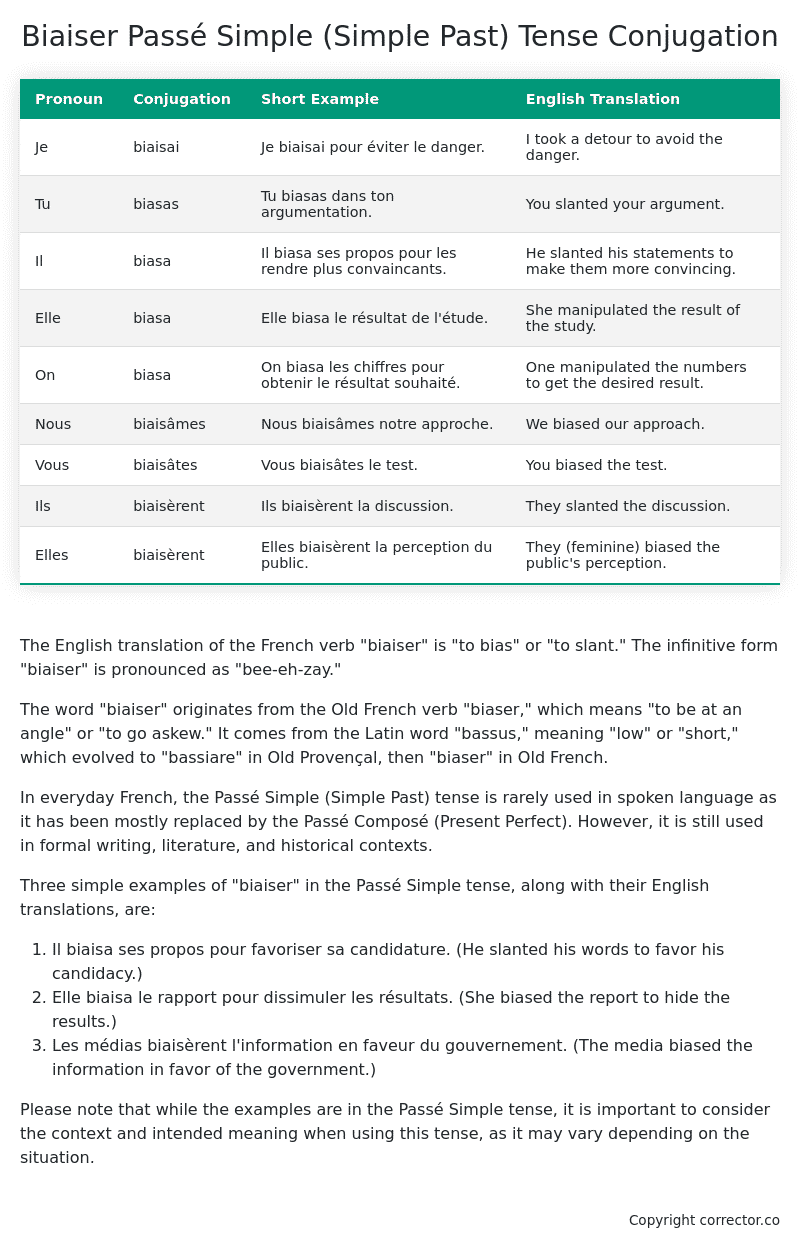Passé Simple (Simple Past) Tense Conjugation of the French Verb biaiser
Introduction to the verb biaiser
The English translation of the French verb “biaiser” is “to bias” or “to slant.” The infinitive form “biaiser” is pronounced as “bee-eh-zay.”
The word “biaiser” originates from the Old French verb “biaser,” which means “to be at an angle” or “to go askew.” It comes from the Latin word “bassus,” meaning “low” or “short,” which evolved to “bassiare” in Old Provençal, then “biaser” in Old French.
In everyday French, the Passé Simple (Simple Past) tense is rarely used in spoken language as it has been mostly replaced by the Passé Composé (Present Perfect). However, it is still used in formal writing, literature, and historical contexts.
Three simple examples of “biaiser” in the Passé Simple tense, along with their English translations, are:
- Il biaisa ses propos pour favoriser sa candidature.
(He slanted his words to favor his candidacy.) - Elle biaisa le rapport pour dissimuler les résultats.
(She biased the report to hide the results.) - Les médias biaisèrent l’information en faveur du gouvernement.
(The media biased the information in favor of the government.)
Please note that while the examples are in the Passé Simple tense, it is important to consider the context and intended meaning when using this tense, as it may vary depending on the situation.
Table of the Passé Simple (Simple Past) Tense Conjugation of biaiser
| Pronoun | Conjugation | Short Example | English Translation |
|---|---|---|---|
| Je | biaisai | Je biaisai pour éviter le danger. | I took a detour to avoid the danger. |
| Tu | biasas | Tu biasas dans ton argumentation. | You slanted your argument. |
| Il | biasa | Il biasa ses propos pour les rendre plus convaincants. | He slanted his statements to make them more convincing. |
| Elle | biasa | Elle biasa le résultat de l’étude. | She manipulated the result of the study. |
| On | biasa | On biasa les chiffres pour obtenir le résultat souhaité. | One manipulated the numbers to get the desired result. |
| Nous | biaisâmes | Nous biaisâmes notre approche. | We biased our approach. |
| Vous | biaisâtes | Vous biaisâtes le test. | You biased the test. |
| Ils | biaisèrent | Ils biaisèrent la discussion. | They slanted the discussion. |
| Elles | biaisèrent | Elles biaisèrent la perception du public. | They (feminine) biased the public’s perception. |
Other Conjugations for Biaiser.
Le Present (Present Tense) Conjugation of the French Verb biaiser
Imparfait (Imperfect) Tense Conjugation of the French Verb biaiser
Passé Simple (Simple Past) Tense Conjugation of the French Verb biaiser (You’re reading it right now!)
Passé Composé (Present Perfect) Tense Conjugation of the French Verb biaiser
Futur Simple (Simple Future) Tense Conjugation of the French Verb biaiser
Futur Proche (Near Future) Tense Conjugation of the French Verb biaiser
Plus-que-parfait (Pluperfect) Tense Conjugation of the French Verb biaiser
Passé Antérieur (Past Anterior) Tense Conjugation of the French Verb biaiser
Futur Antérieur (Future Anterior) Tense Conjugation of the French Verb biaiser
Subjonctif Présent (Subjunctive Present) Tense Conjugation of the French Verb biaiser
Subjonctif Passé (Subjunctive Past) Tense Conjugation of the French Verb biaiser
Subjonctif Imparfait (Subjunctive Imperfect) Tense Conjugation of the French Verb biaiser
Subjonctif Plus-que-parfait (Subjunctive Pluperfect) Tense Conjugation of the French Verb biaiser
Conditionnel Présent (Conditional Present) Tense Conjugation of the French Verb biaiser
Conditionnel Passé (Conditional Past) Tense Conjugation of the French Verb biaiser
Conditionnel Passé II (Conditional Past II) Tense Conjugation of the French Verb biaiser
L’impératif Présent (Imperative Present) Tense Conjugation of the French Verb biaiser
L’impératif Passé (Imperative Past) Tense Conjugation of the French Verb biaiser
L’infinitif Présent (Infinitive Present) Tense Conjugation of the French Verb biaiser
L’infinitif Passé (Infinitive Past) Tense Conjugation of the French Verb biaiser
Le Participe Présent (Present Participle) Tense Conjugation of the French Verb biaiser
Le Participe Passé (Past Participle) Tense Conjugation of the French Verb biaiser
Struggling with French verbs or the language in general? Why not use our free French Grammar Checker – no registration required!
Get a FREE Download Study Sheet of this Conjugation 🔥
Simply right click the image below, click “save image” and get your free reference for the biaiser Passé Simple tense conjugation!

Biaiser – About the French Passé Simple (Simple Past) Tense
Formation
Usage
Narration
Historical Context
Interactions with other tenses
Passé Composé
Imparfait
Conditional and Subjunctive
Summary
I hope you enjoyed this article on the verb biaiser. Still in a learning mood? Check out another TOTALLY random French verb conjugation!


